If you have central or obstructive sleep apnea and use continuous positive airway pressure (CPAP) therapy to have a good night’s sleep and keep your condition under control, you might be wondering how to travel with your device, and we’re going to tell you how you’ll achieve just that!
Continue reading to learn more about how to travel without missing out on your sleep apnea treatment.
Air Travel Tips for Bringing Your CPAP Machine on Board
When you’re going on a trip, you want to have everything planned out to have the best experience possible. If you are a CPAP user, you likely need to plan where you will place your CPAP equipment.
If you’re planning to fly with your CPAP machine and are looking for helpful tips to make it easier, follow these recommendations for traveling with this medical device.

ResMed AirMini AutoSet Travel CPAP Machine
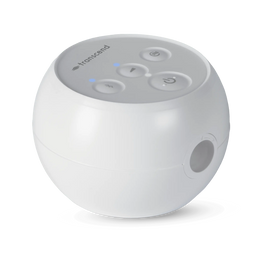
Transcend Micro Auto Travel CPAP Machine
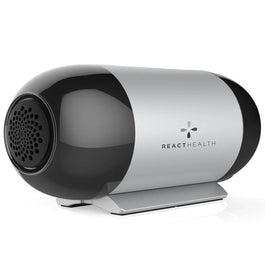
Luna TravelPAP Travel CPAP Machine
Never Check Your CPAP Machine as Baggage
When you check your CPAP machine as luggage, there’s a chance it will get lost or damaged in transit. So it’s safer to keep it in its carrying case or your travel bag to avoid the hassle and stress.
According to the Americans with Disabilities Act, medical equipment, including CPAP machines, is not counted towards your carry-on bag quota. Carry your machine in a bag separate from your other personal items. Fortunately, most travel CPAP machines are small portable devices with a travel bag.

Keep Your Doctor’s Prescription Handy
Although it’s not mandatory, a Transportation Security Administration agent (TSA agent) may ask for a copy of your prescription if they need additional confirmation for your equipment. If you don’t have it when airport security asks for it, they may not allow you to get your CPAP machine on the plane.
Moreover, if your CPAP device breaks down, you'll need a prescription from your healthcare provider for an emergency replacement. So, it’s good practice to keep your doctor's prescription handy.
Check Your CPAP Equipment in Advance
We recommend that you have your CPAP machine, CPAP mask, humidifier, power cord, power adapter, and extra supplies checked at least two weeks before your trip. This will give you time to order the necessary replacements so that you don’t miss out on your CPAP therapy.
Clean and Dry Before Packing
Thoroughly clean your CPAP equipment immediately before you pack it. Make sure everything is completely dry to prevent the formation of mold and mildew while it’s not in use.
Pack Your CPAP Machine in a Clear Plastic Bag
Your CPAP machine will be thoroughly screened at the airport security checkpoints at the airport. For that, you'll need to take it out of its carrying case and put it in an X-ray bin so they can inspect it. You can keep the CPAP mask and other CPAP equipment in the travel bag, as only the machine will be x-rayed.
Though these bins are clean, they are not exactly sterile. So, if you are worried about their cleanliness, you can put your machine in a sterile, clear plastic bag before placing it in the X-ray bin.
Carry Extra CPAP Supplies
Anything can happen when you are far away from home, so you should always have extra supplies in case something doesn’t go according to plan. Bring at least one extra CPAP mask, a CPAP tube, and an extension cord with a converter for the country you’re going to.
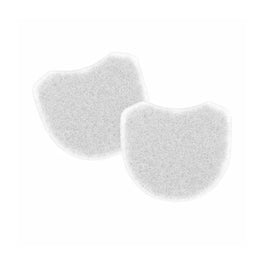
AirMini Disposable Fine Filters
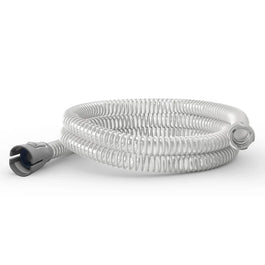
ResMed AirMini Travel CPAP Flexible Tubing
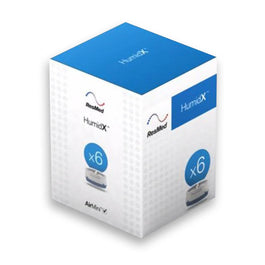
HumidX Standard Waterless Humidifier for AirMini
Bring Backup CPAP Batteries
Carrying a few extra battery packs never hurts anyone, especially if you’re going to spend a prolonged period of time in a place without proper power outlets or an unreliable power supply.
Carry Distilled Water
Carry distilled water with you if you plan to use your CPAP machine’s humidifier. You can bring up to 3.4 oz of distilled water inside the plane as a carry-on, but there’s no limit to how much distilled water you can carry in your checked-in luggage.
Now that you know this, there’s no need to fill your CPAP machine’s water tank with tap or bottled water and risk jeopardizing its functionality.
Don’t Forget About Waterless Humidification
If traveling with distilled water is not feasible for you, some travel CPAP machines, such as the ResMed AirMini, have a waterless humidification system that can help you save space and travel lighter.

ResMed AirMini AutoSet Travel CPAP Machine
Check Your Airline Policies on CPAP Usage
The policies on the in-flight use of a CPAP machine may vary according to the airline you’re flying with. Certain airlines require you to submit a minimum of 48 hours' notice regarding using CPAP machines on the aircraft. This helps them to verify that your device's model meets the standards and regulations of the Federal Aviation Administration (FAA).
If you don’t know your airline’s policy, don’t hesitate to call them ahead of your trip, so that you don’t run into any issues the day of your flight.

Ensure the Availability of an At-Seat Power Outlet
If your CPAP machine runs on electricity and you plan on using it on your flight, you should ask to be assigned a seat with a power outlet nearby, or if you are going to need an extension cord to power up your CPAP device. Don’t forget to contact the airline to get all this information in advance.
Place a Medical Equipment Tag on Your CPAP Machine’s Bag
It’s good practice to place a medical equipment tag on the carrying case for your CPAP machine so that the TSA agents know they need to handle it gently, as they may be compromising your health if they don’t.
If you’re planning a trip and your CPAP machine is too bulky for you to take with you, at Sleeplay, we offer CPAP machines for travelers.
Can You Use a CPAP Machine on a Plane?
If you’re planning on sleeping on your flight, it’s possible for you to use your CPAP machine in-flight. Most CPAP machines are FAA-approved. However, it’s important that you have a note from your doctor about the need to use it during the flight.
Let the aircrew know, before the flight, that you need to use your CPAP machine during the trip. Check the FAA website to make sure that your CPAP machine can be used on a plane to avoid any issues. Travel CPAP machines and most modern CPAP machines are designed for quiet operation, which ensures minimal disturbance to others during the flight.
If your airplane seat isn’t going to have a power outlet available, prepare by carrying a power supply or getting a portable CPAP machine that runs on a battery pack.
How to Sleep on a Plane with Sleep Apnea?
If you have sleep apnea, traveling by plane can be challenging. You may have trouble falling asleep or staying asleep in a cramped and noisy environment. Here are some tips that can help you get a better rest on your flight:
Wear an eye mask:
An eye mask can block out the bright lights and help you relax. It can signal to your brain that it’s time to sleep and reduce the effects of jet lag.
Practice meditation:
Meditation can calm your mind and body and prepare you for sleep. You can use a guided meditation app or simply focus on your breathing. Meditation can also lower your blood pressure and heart rate, which can improve your sleep quality.
Bring an extra pillow:
A pillow can provide support and comfort for your neck and head. It can also help you maintain a good sleeping posture and prevent snoring. You can use a travel pillow or ask for an extra one from the flight attendant.
Avoid alcoholic beverages
Alcohol can disrupt your sleep cycle and worsen your sleep apnea symptoms. It can also dehydrate you and make you feel more tired. Instead of drinking alcohol, opt for water, juice, or herbal tea.
Use your CPAP machine:
If you have an FAA-approved CPAP machine, bring it with you on the plane to make sure that you keep your sleep apnea symptoms under control.
Use headphones:
Headphones can block out the noise and help you relax. You can listen to soothing music, white noise, or ambient sounds. You can also use noise-canceling headphones or earplugs to reduce the noise level.
By following these tips, you can improve your chances of getting restful sleep on a plane if you have sleep apnea.

FAQs
Flying with a CPAP machine can seem daunting, but it doesn’t have to be. Below, we answer some of the most common questions people have about traveling with their CPAP machine.
Is a CPAP Machine Considered Carry-on?
Since CPAP machines are medical devices, they are allowed on board as carry-on items, but they don’t count towards your carry-on allowance. This applies to domestic US flights, as well as international flights.
Do Airlines Charge for CPAP Machines?
Generally, airlines don’t charge for taking a CPAP machine on a flight, but specific CPAP policies may vary according to the airline you are flying with.
Can I Use Bottled Water in My CPAP Humidifier for One Night?
It’s not recommended to use bottled water in your CPAP humidifier, as it may contain minerals and contaminants that may damage your machine or cause infections. If you don’t have access to distilled water, you can use boiled tap water, as long as it’s mineral-free, but you’ll have to clean your humidifier chamber thoroughly afterwards.
Can I Travel with Distilled Water for My CPAP Machine?
You can carry up to 3.4 oz of distilled water on the plane as part of your carry-on luggage.
Is a CPAP Machine Considered a Medical Device for Air Travel?
Yes, CPAP machines are included in the medical devices that are allowed for air travel. However, you should always check the airline’s policies regarding the procedure to allow the CPAP machine on the plane.
What Do People with Sleep Apnea Do on Long Flights?
People with sleep apnea can receive their CPAP therapy while they are on a long flight, as long as they follow the airline's guidelines and their CPAP machine is FAA-approved.
What Is a TSA Card for a Medical Device?
The TSA identification card allows airport security personnel to be informed of any illness or disability to make the necessary accommodations.
Can I Use My CPAP Machine in Other Countries?
Before traveling, seek advice from your CPAP suppliers to find out if your CPAP machine is suitable to be use in another country. As a general rule, most modern CPAP machines can operate on the different voltages used around the world without the need for modifications. However, if your CPAP machine can’t operate on voltages different to the one in your home country, you should buy a voltage converter.
Traveling with a CPAP machine can be a rewarding experience, as you’ll be able to enjoy your trip without compromising your sleep quality and health. However, it requires some planning and preparation that can't be put off until the last minute.
Planning a road trip or a vacation soon? At Sleeplay, we have the perfect solution to easily treat sleep apnea during your trips. Choose the CPAP travel machine that best suits your needs by reviewing the CPAP collection at Sleeplay.

















































